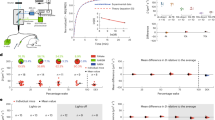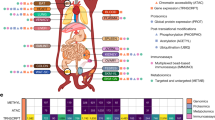Abstract
Background/objectives:
The extent to which alterations in energy expenditure (EE) in response to sleep restriction contribute to the short sleep–obesity relationship is not clearly defined. Short sleep may induce changes in resting metabolic rate (RMR), thermic effect of food (TEF) and postprandial substrate oxidation.
Subjects/methods:
Ten females (age and body mass index: 22–43 years and 23.4–28 kg m−2) completed a randomized, crossover study assessing the effects of short (4 h per night) and habitual (8 h per night) sleep duration on fasting and postprandial RMR and respiratory quotient (RQ). Measurements were taken after three nights using whole-room indirect calorimetry. The TEF was assessed over a 6-h period following consumption of a high-fat liquid meal.
Results:
Short versus habitual sleep did not affect RMR (1.01±0.05 and 0.97±0.04 kcal min−1; P=0.23). Fasting RQ was significantly lower after short versus habitual sleep (0.84±0.01 and 0.88±0.01; P=0.028). Postprandial EE (short: 1.13±0.04 and habitual: 1.10±0.04, P=0.09) and RQ (short: 0.88±0.01 and habitual: 0.88±0.01, P=0.50) after the high-fat meal were not different between conditions. TEF was similar between conditions (0.24±0.02 kcal min−1 in both; P=0.98), as was the ∼6-h incremental area under the curve (1.16±0.10 and 1.17±0.09 kcal min−1 × 356 min after short and habitual sleep, respectively; P=0.92).
Conclusions:
Current findings observed in non-obese healthy premenopausal women do not support the hypothesis that alterations in TEF and postprandial substrate oxidation are major contributors to the higher rate of obesity observed in short sleepers. In exploring a role of sleep duration on EE, research should focus on potential alterations in physical activity to explain the increased obesity risk in short sleepers.
This is a preview of subscription content, access via your institution
Access options
Subscribe to this journal
Receive 12 print issues and online access
$259.00 per year
only $21.58 per issue
Buy this article
- Purchase on Springer Link
- Instant access to full article PDF
Prices may be subject to local taxes which are calculated during checkout



Similar content being viewed by others
References
Jung CM, Melanson EL, Frydendall EJ, Perreault L, Eckel RH, Wright KP . Energy expenditure during sleep, sleep deprivation and sleep following sleep deprivation in adult humans. J Physiol 2011; 589: 235–244.
Benedict C, Hallschmid M, Lassen A, Mahnke C, Schultes B, Schioth HB et al. Acute sleep deprivation reduces energy expenditure in healthy men. Am J Clin Nutr 2011; 93: 1229–1236.
Brondel L, Romer MA, Nougues PM, Touyarou P, Davenne D . Acute partial sleep deprivation increases food intake in healthy men. Am J Clin Nutr 2010; 91: 1550–1559.
St-Onge MP, Roberts AL, Chen J, Kelleman M, O'Keeffe M, RoyChoudhury A et al. Short sleep duration increases energy intakes but does not change energy expenditure in normal-weight individuals. Am J Clin Nutr 2011; 94: 410–416.
Nedeltcheva AV, Kilkus JM, Imperial J, Kasza K, Schoeller DA, Penev PD . Sleep curtailment is accompanied by increased intake of calories from snacks. Am J Clin Nutr 2009; 89: 126–133.
Markwald RR, Melanson EL, Smith MR, Higgins J, Perreault L, Eckel RH et al. Impact of insufficient sleep on total daily energy expenditure, food intake, and weight gain. Proc Natl Acad Sci USA 2013; 110: 5695–5700.
Hogenkamp PS, Nilsson E, Nilsson VC, Chapman CD, Vogel H, Lundberg LS et al. Acute sleep deprivation increases portion size and affects food choice in young men. Psychoneuroendocrinology 2013; 38: 1668–1674.
Chapman CD, Nilsson EK, Nilsson VC, Cedernaes J, Rangtell FH, Vogel H et al. Acute sleep deprivation increases food purchasing in men. Obesity (Silver Spring) 2013; 21: E555–E560.
Penev PD . Update on energy homeostasis and insufficient sleep. J Clin Endocrinol Metab 2012; 97: 1792–1801.
Buxton OM, Pavlova M, Reid EW, Wang W, Simonson DC, Adler GK . Sleep restriction for 1 week reduces insulin sensitivity in healthy men. Diabetes 2010; 59: 2126–2133.
Klingenberg L, Chaput JP, Holmback U, Jennum P, Astrup A, Sjodin A . Sleep restriction is not associated with a positive energy balance in adolescent boys. Am J Clin Nutr 2012; 96: 240–248.
Bosy-Westphal A, Hinrichs S, Jauch-Chara K, Hitze B, Later W, Wilms B et al. Influence of partial sleep deprivation on energy balance and insulin sensitivity in healthy women. Obes Facts 2008; 1: 266–273.
Horne JA, Ostberg O . A self-assessment questionnaire to determine morningness-eveningness in human circadian rhythms. Int J Chronobiol 1976; 4: 97–110.
Shechter A, Rising R, Albu JB, St-Onge MP . Experimental sleep curtailment causes wake-dependent increases in 24-hour energy expenditure as measured by whole-room indirect calorimetry. Am J Clin Nutr 2013; 98: 1433–1439.
Melanson EL, Ingebrigtsen JP, Bergouignan A, Ohkawara K, Kohrt WM, Lighton JR . A new approach for flow-through respirometry measurements in humans. Am J Physiol Regul Integr Comp Physiol 2010; 298: R1571–R1579.
Weir JB . New methods for calculating metabolic rate with special reference to protein metabolism. J Physiol 1949; 109: 1–9.
Lusk G . The Elements of the Science of Nutrition. WB Saunders Company: Philadelphia, 1928.
Whyte KJ, Rising R, Albu JB, Pi-Sunyer X . Evaluation of a new whole room indirect calorimeter for measurement of resting metabolic rate. FASEB J 2013; 27: 859.
Bradley DL . Computer simulation with DATASIM. Behav Res Methods Instrum Computers 1989; 21: 99–112.
Ravussin E, Lillioja S, Knowler WC, Christin L, Freymond D, Abbott WG et al. Reduced rate of energy expenditure as a risk factor for body-weight gain. N Engl J Med 1988; 318: 467–472.
Weinsier RL, Nelson KM, Hensrud DD, Darnell BE, Hunter GR, Schutz Y . Metabolic predictors of obesity. Contribution of resting energy expenditure, thermic effect of food, and fuel utilization to four-year weight gain of post-obese and never-obese women. J Clin Invest 1995; 95: 980–985.
Seidell JC, Muller DC, Sorkin JD, Andres R . Fasting respiratory exchange ratio and resting metabolic rate as predictors of weight gain: the Baltimore Longitudinal Study on Aging. Int J Obes Relat Metab Disord 1992; 16: 667–674.
Schmid SM, Hallschmid M, Jauch-Chara K, Wilms B, Benedict C, Lehnert H et al. Short-term sleep loss decreases physical activity under free-living conditions but does not increase food intake under time-deprived laboratory conditions in healthy men. Am J Clin Nutr 2009; 90: 1476–1482.
Soares CN . Insomnia in women: an overlooked epidemic? Arch Womens Ment Health 2005; 8: 205–213.
Paeratakul S, White MA, Williamson DA, Ryan DH, Bray GA . Sex, race/ethnicity, socioeconomic status, and BMI in relation to self-perception of overweight. Obes Res 2002; 10: 345–350.
Solomon SJ, Kurzer MS, Calloway DH . Menstrual cycle and basal metabolic rate in women. Am J Clin Nutr 1982; 36: 611–616.
Isacco L, Duche P, Boisseau N . Influence of hormonal status on substrate utilization at rest and during exercise in the female population. Sports Med 2012; 42: 327–342.
Piers LS, Diggavi SN, Rijskamp J, van Raaij JM, Shetty PS, Hautvast JG . Resting metabolic rate and thermic effect of a meal in the follicular and luteal phases of the menstrual cycle in well-nourished Indian women. Am J Clin Nutr 1995; 61: 296–302.
Melanson KJ, Saltzman E, Russell R, Roberts SB . Postabsorptive and postprandial energy expenditure and substrate oxidation do not change during the menstrual cycle in young women. J Nutr 1996; 126: 2531–2538.
Shechter A, O'Keeffe M, Roberts AL, Zammit GK, RoyChoudhury A, St-Onge MP . Alterations in sleep architecture in response to experimental sleep curtailment are associated with signs of positive energy balance. Am J Physiol Regul Integr Comp Physiol 2012; 303: R883–R889.
Van Dongen HP, Maislin G, Mullington JM, Dinges DF . The cumulative cost of additional wakefulness: dose-response effects on neurobehavioral functions and sleep physiology from chronic sleep restriction and total sleep deprivation. Sleep 2003; 26: 117–126.
Ohayon MM, Carskadon MA, Guilleminault C, Vitiello MV . Meta-analysis of quantitative sleep parameters from childhood to old age in healthy individuals: developing normative sleep values across the human lifespan. Sleep 2004; 27: 1255–1273.
Benedict C . Link between short sleep and obesity in humans: a matter of age? Chest 2013; 144: 711.
Acknowledgements
We thank Majella O’Keeffe PhD and also the staff of the Bionutrition Unit at the Irving Institute for Clinical and Translational Research for their help in conducting the study, and also our research participants. This study was supported by the National Institutes of Health grants R01 HL091352 (M-P St-O), T32 DK007559 (AS) and P30 DK26687 (New York Obesity Nutrition Research Center), and St Luke’s/Roosevelt Pilot and Feasibility grant (M-P St-O). This publication was supported by the National Center for Advancing Translational Sciences, National Institutes of Health, through grant number UL1 TR000040, formerly the National Center for Research Resources, grant number UL1 RR024156. The content is solely the responsibility of the authors and does not necessarily represent the official views of the NIH.
Author information
Authors and Affiliations
Corresponding author
Ethics declarations
Competing interests
The authors declare no conflict of interest.
Additional information
Author contributions
MPSO designed the research; AS, RR and SW conducted the research; AS, RR, SW, JBA and MPSO collected the data; AS, RR and MPSO analyzed the data; AS and MPSO wrote the manuscript. MPSO had primary responsibility for final content; all authors read and approved the final manuscript.
Rights and permissions
About this article
Cite this article
Shechter, A., Rising, R., Wolfe, S. et al. Postprandial thermogenesis and substrate oxidation are unaffected by sleep restriction. Int J Obes 38, 1153–1158 (2014). https://doi.org/10.1038/ijo.2013.239
Received:
Revised:
Accepted:
Published:
Issue Date:
DOI: https://doi.org/10.1038/ijo.2013.239
Keywords
This article is cited by
-
Noise-induced sleep disruption increases weight gain and decreases energy metabolism in female rats
International Journal of Obesity (2019)
-
Effect of shortened sleep on energy expenditure, core body temperature, and appetite: a human randomised crossover trial
Scientific Reports (2017)
-
The effects of partial sleep deprivation on energy balance: a systematic review and meta-analysis
European Journal of Clinical Nutrition (2017)
-
The Role of Sleep Duration on Energy Balance: an Update
Current Nutrition Reports (2016)



